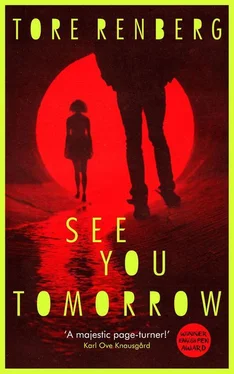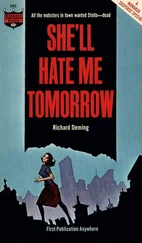Pål isn’t the one who pipes up a lot at parents’ meetings. He isn’t the one who talks loudest in work. He isn’t the one who comes out with fresh ideas. He’s never been called intense, never been called conspicuous and never been called dangerous. But he has been called kind, been called good and been called reliable. That was what his wife used to say, I need you, Pål, you bring balance to my life . Right. Well, suddenly one day you didn’t need that any more, did you, Christine?
Pål has always thought that he sees the world as it is.
Seems like that was a bit too boring for her though, doesn’t it?
Eh, Christine? Everything you said you needed, everything you said I represented, all that you needed in your life in order for it to make sense. A husband who arrived home at the same time every day, who kept the household in order and took care of all the day-to-day stuff. You started looking in another direction. And then you just left.
Pål, I can’t do this any more.
You’ve been so, so very kind.
You’ve been so, so very dependable.
But I have to go.
You’re just going to leave me here?
You’ll manage, Pål.
You’re just going to leave the girls?
They’ll understand someday, Pål.
Have you lost your bloody mind?
You’re strong, Pål, remember that.
Pål scratches Zitha behind the ears. Strong? His eyes are dry, like there’s a white light against them. Malene is right: he needs to see the doctor. Strong? He’s never felt strong. We’ve just lived, Pål thinks, from one day to the next, we’ve tried to do as well as we could. Often, when he hears people discussing their lives, it seems like they’re talking about a series of choices they’ve made. It doesn’t feel like that to Pål. It feels, for the most part, as though life were a river and he’s been a boat. The girls have gotten bigger. Malene has had her gymnastics. She’s practically grown up in that hall — palm guards, chalk, glittering leotards, ice packs and perseverance. Tiril has been a tornado, ferocious intensity, with a restlessness to match. They’ve travelled backwards and forwards to Bergen a couple of times a month and come home with expensive clothes and make-up: love from Mum. Malene has gone along with being driven to the airport, gone along with being picked up again, and Tiril has hated it from day one. Everything to do with her mother is just fuel to an ever raging fire within her.
He knew Christine could be cynical, but that she could actually go ahead and leave the kids, that was cold. Withdraw from their childhood and stake everything on Statoil and that guy from Bergen. Albeit that was Pål’s only consolation: he was left with the kids. The girls had kept things afloat. The drive to gymnastics. The sight of Malene doing backflips, the shouts of the trainer in the hall: Good, Malene! Come on, now straighten up! You need to jump sooner. Wrists straight. Such a shame about that injury; she landed badly on her ankle in the spring, never screamed like that before. She hasn’t trained properly since.
Tiril?
Trying to catch her eye, get beyond that wild gaze, never succeeding.
The girls are all he’s got. He can’t take them over the brink with him. He has to do something, otherwise he may as well put a bullet through his head. Whether or not what he’s about to do is a good idea, he doesn’t know. But it’s the only idea he’s got.
Pål halts at the bus stop on Folkeviseveien. He reaches for his inside pocket. ‘There, there, Zitha,’ he whispers as he takes out the envelope, ‘Daddy’s just going to get rid of this.’ He feels the relief as the envelope lands in the bus shelter bin. Together with all the others. It feels like it’s taking all the mould along with it, as if his problems were actually over, and he smacks his lips at Zitha, walks out from under the shelter, back up the hill and doesn’t cross over until he’s reached the back of the high-rises.
They walk along the footpath, the fields enlarging the landscape around them. Zitha is frisky and happy.
‘There, Zitha, there. Go on!’
He walks her every day. Usually up to the fields and forests of Sørmarka, to Hinnaberget, sometimes down to the sea at Møllebukta, but mostly they go to Limahaugen by the Iron Age Farm. Get outdoors, feel like the blood is flowing from Zitha’s body over to his. He sees how she tenses up when she picks up the scent of something, sees how her body spurts across the ground. ‘Yeah, yeah, Zitha. Go on!’ What he likes most is standing on top of Limahaugen, close to the old cairn, and looking down at Hafrsfjord. The three islands, Prestøy, Somsøy and Kobbholmen, lying there like three brothers. He and a mate used to go out there when they were small, to Sømsøy, except they called it Bunny Island on account of all the rabbits running around. Long time ago now.
This is what he likes best. Him, with the dog by his side. If anyone was ever going to paint a portrait of him, then this is what would fill the canvas.
But no one, he thinks, has any idea what I’m up to.
Getting close to nine o’clock.
This isn’t going to work out, is it?
Below him lies the forest.
He has the blocks of flats to his right, Limahaugen to his left, and on the horizon the telecom tower at Ullandhaug. Once past the flats, the primary school comes into view. Madlavoll. The one he went to so many years ago. The gym, football pitch, the school building. Brand new in the eighties, seems old now, run-down and out of date. Happens to everything. Everything that was modern, forced to become so faded. Pål looks over at the schoolyard. That’s where they played football, where the girls jumped rope, they were there, all of them. Jørgen, Lise, Thomas, Jarle, Bülent, Susanne, Anna and Prince. Prince. What a character. That’s all we called him, Prince. He was a damn good breakdancer. Him and Inge. They were the first ones in school to do handstands, had to beat the women off with a stick. Then the girls of course, Hilde, Marianne, ah, she was gorgeous. Funny about the girls you never get. They can haunt you for the rest of your life. And Anne Mette, she became an actor, she did, and then there was Odd … Odd Jonas, no … Odd Roger, the guy with the forehead covered in zits, big guy. Yeah, Odd Roger. Something screwed-up there. Wasn’t right in the head. Just filled up with hate … and Pesi … He died, didn’t he? Yeah, junkie. Popped his clogs.
Strange thinking about the old gang.
Feels painful. And it feels good.
And Hasse — imagine, they were so close in secondary school, for a while they were together day and night, and now? They’re embarrassed when they meet. Hasse has become a bit of a minor celebrity, works for the Minister of Culture in Oslo. What would he have said if he knew what Pål was doing now? Jesus, Pål. You’re playing with fire. Jesus Christ, Pål, you’re heading into the depths of the forest.
The dog tugs at the leash.
‘Yeah, come on, Zitha,’ he says, ‘Come on.’
He’s thought a lot about that school reunion. They arrived one by one, face after face, half-forgotten memories dancing in front of his eyes. Ådne from Class 6B worked for the national health service and had lost his wife to cancer. Bjarne from 6C had MS. Kjartan from 6A had become a multi-millionaire, something to do with selling equipment to the oil business. Tine, Mimi and Anja tottered on high heels, drank gin & tonics and white wine and talked about Thomas Dybdahl, Karl Ove Knausgård and George Clooney, and were on the razz for the first time in ages. A lot of the lads turned up with pear-shaped bodies and potbellies and tried as well as they could to chat about football and the old days. All Pål could think about was how everyone had lost. Everyone, including me, has lost. We’re losing all the time, and we’re losing hard, but at the same time our helplessness shines like small, blushing suns.
Читать дальше












